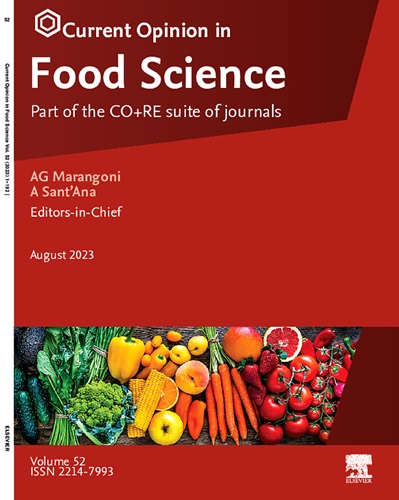解决饮食问题:饮食作为行为改变的食物选择启发式
IF 8.9
1区 农林科学
Q1 FOOD SCIENCE & TECHNOLOGY
引用次数: 0
摘要
饮食问题是选择健康和负担得起的食物组合来吃的挑战。这个问题很复杂,涉及许多可能的食物、食物属性、环境和潜在的组合。目前的观点是,人们通过使用食物作为食物选择启发式来解决饮食问题:快速有效地解决每天面临的计算复杂的饮食问题。饭菜的计划和准备代表了一种特定的、与他人共享的、依赖于环境的食物选择行为。膳食是烹饪的一部分,烹饪本身遵循一套规则或语法,这些规则或语法反映了个人饮食中必要、正常或禁忌的内容。这些规则可能反映了文化、地理、历史和社会地位。本文讨论了饮食和启发式行为研究之间的相似之处,包括最近支持启发式食物选择的证据。本文还讨论了关注膳食对饮食改变干预的潜在价值。目前的观点是,针对膳食的干预措施,以促进个人、社会或地球的积极饮食行为,可能比针对单一营养素、食物组或整体饮食的干预措施更有影响力。本文章由计算机程序翻译,如有差异,请以英文原文为准。
Solving the diet problem: meals as food choice heuristics for behaviour change
The diet problem is the challenge of choosing a healthy and affordable combination of foods to eat. This problem is complex, involving many possible foods, food attributes, contexts, and potential combinations. The current thesis is that people solve the diet problem by using meals as food choice heuristics: quick and efficient solutions to the computationally elaborate diet problem faced daily. The planning and preparation of meals represent a food choice behaviour that is specific, shared with others and context dependent. Meals are a part of cuisine, which itself follows a set of rules or grammar that reflect what is essential, normal or taboo in a diet for an individual. These rules likely reflect culture, geography, history and social status. The parallels between meals and heuristics from behaviour research are discussed, including recent evidence that support the proposal that food choices are made using heuristics. The potential value of focusing on meals for dietary change interventions is also discussed. The current thesis is that interventions that target meals to promote positive dietary behaviour for the individual, society or planet could be more impactful than those that target single nutrients, food groups or holistic diets.
求助全文
通过发布文献求助,成功后即可免费获取论文全文。
去求助
来源期刊

Current Opinion in Food Science
Agricultural and Biological Sciences-Food Science
CiteScore
18.40
自引率
4.00%
发文量
157
审稿时长
92 days
期刊介绍:
Current Opinion in Food Science specifically provides expert views on current advances in food science in a clear and readable format. It also evaluates the most noteworthy papers from original publications, annotated by experts.
Key Features:
Expert Views on Current Advances: Clear and readable insights from experts in the field regarding current advances in food science.
Evaluation of Noteworthy Papers: Annotated evaluations of the most interesting papers from the extensive array of original publications.
Themed Sections: The subject of food science is divided into themed sections, each reviewed once a year.
 求助内容:
求助内容: 应助结果提醒方式:
应助结果提醒方式:


